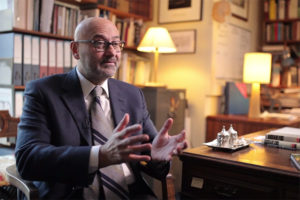End of Knowledge
Philosopher and sociologist of science Steve Fuller on the difference between ontology and epistemology, trans...
What is the research topic of science, technology and society studies? How do scientists and engineers refer to people involved in STS studies? Professor of the History of Science at MIT and Harvard Loren Graham hypothesize on possible problems of bringing Cro-Magnons back to life.
About twenty years ago another change occurred and that is a slightly new field, it’s closely connected to the history science, but it’s not the same, that’s called STS or science, technology and society. And people in this field were not as much interested in describing the old history of science from, say, Galileo to Newton, to Darwin as they were in discussing the interaction between science and technology and society today. So it’s a more contemporary study. People in this field look at in what areas of the world have science and technology most successfully developed and why? Why does it develop more rapidly in some places than other places? And furthermore what are the impacts of science and technology on society?
It should be said that there are some people who criticize also and sometimes the criticism comes from science departments and engineering departments because they want to be free to do whatever they want and they don’t like these people, not all of them but sometimes, they don’t like these people over there in STS programs, who are saying: “You know, you scientists and engineers, you don’t have everything right, you should do some things a little differently, you should listen to us”. And they sometimes say: “Well, why should we listen to you? We are scientists and engineers, you’re not.” But as time is going on we have convinced them or we are convincing them that we’re doing something valuable.
We’re getting so powerful now in our molecular biology that we can create new organisms, we can create maybe even new species or we can rescue species of the past. We’re already talking about would it be possible to bring mammoths, elephants back to life. What if someone said: “Here we’ve got the DNA of a Cro-Magnon man, of a Neanderthal”. Should we bring that person back to life? It’s a pretty deep problem, because you don’t know what kind of a person that might be, you don’t know what the ethical rules should be. Should you treat that person, who lived 5,000-10,000 years ago, maybe 20,000 ago, do you treat that as a fellow human being? Or you treat that as something between an animal and human being? Those are very difficult problems, all that will get discussed.

Philosopher and sociologist of science Steve Fuller on the difference between ontology and epistemology, trans...

Historian Alessandro Scafi on the Medieval knowledge about spherical form of the Earth, compass points on medi...

Economist Lawrence H. White on the period of the international gold standard, cryptocurrencies, and the Consti...